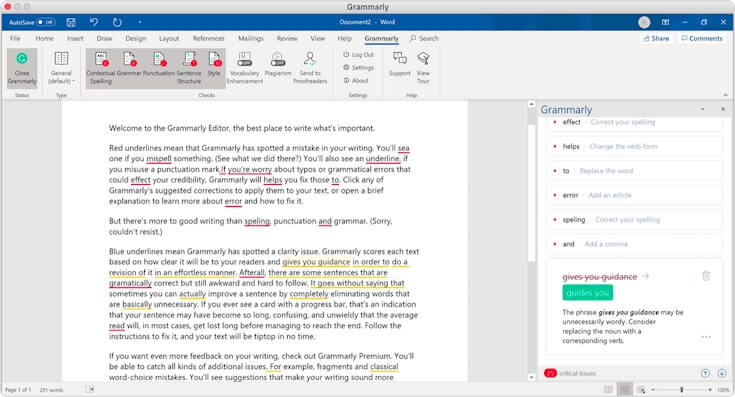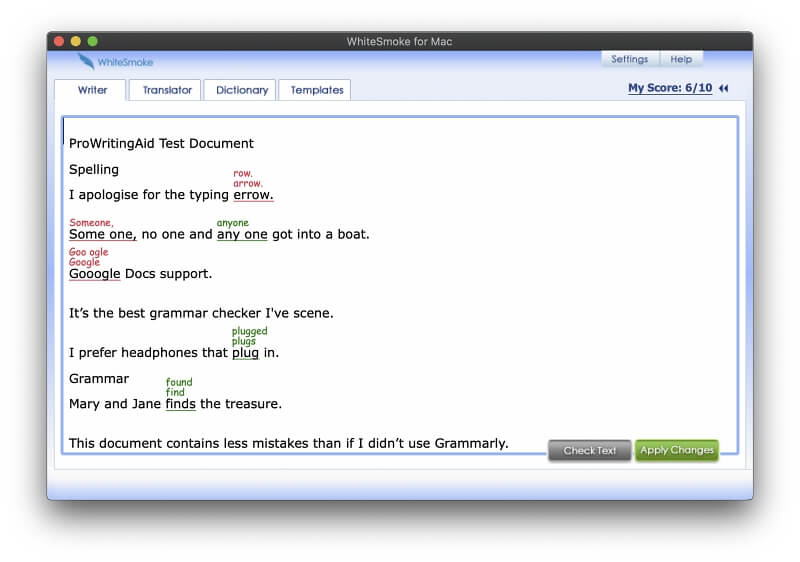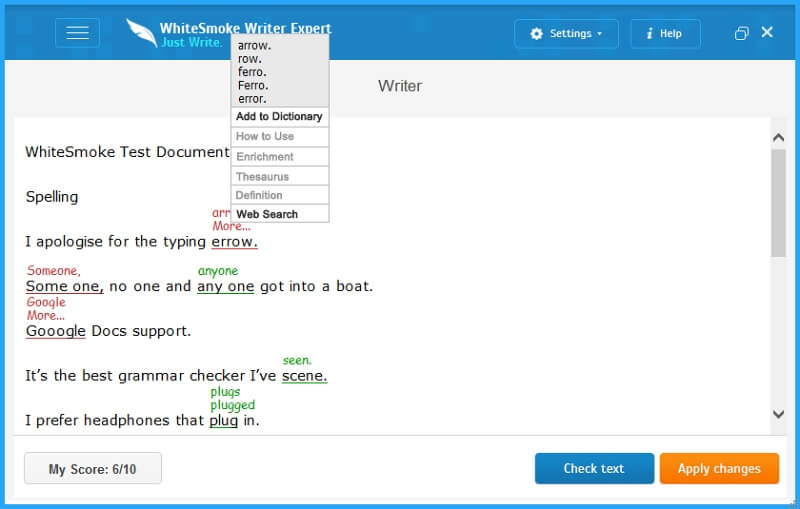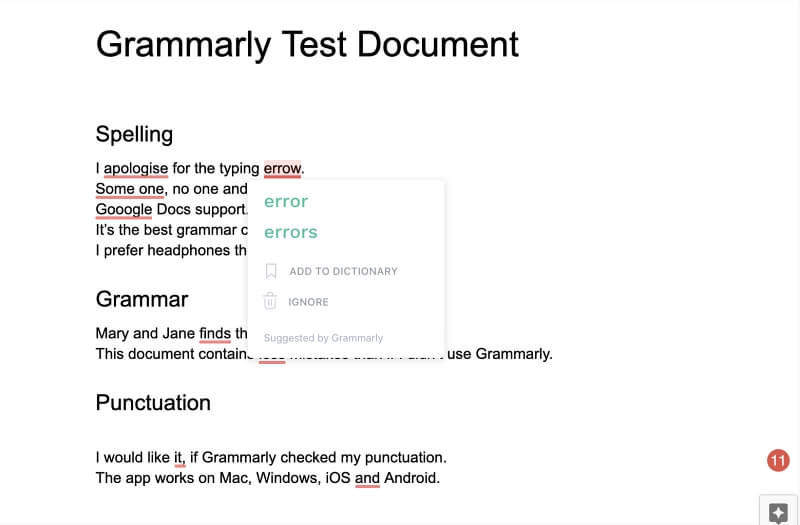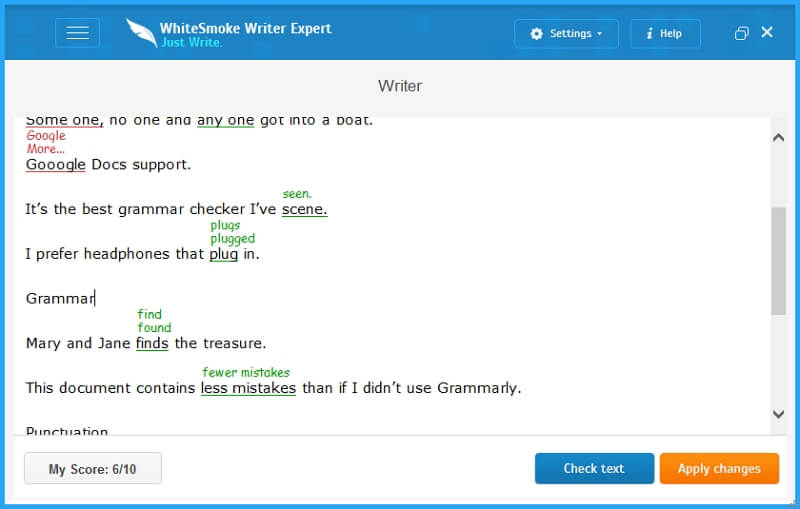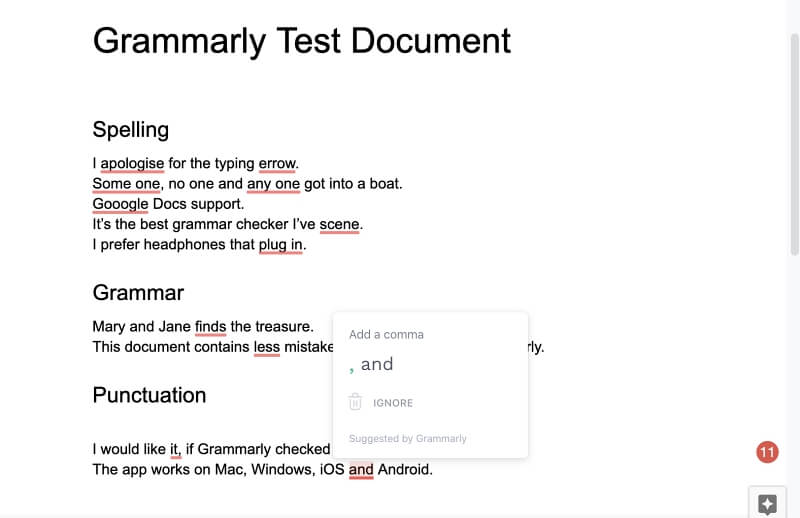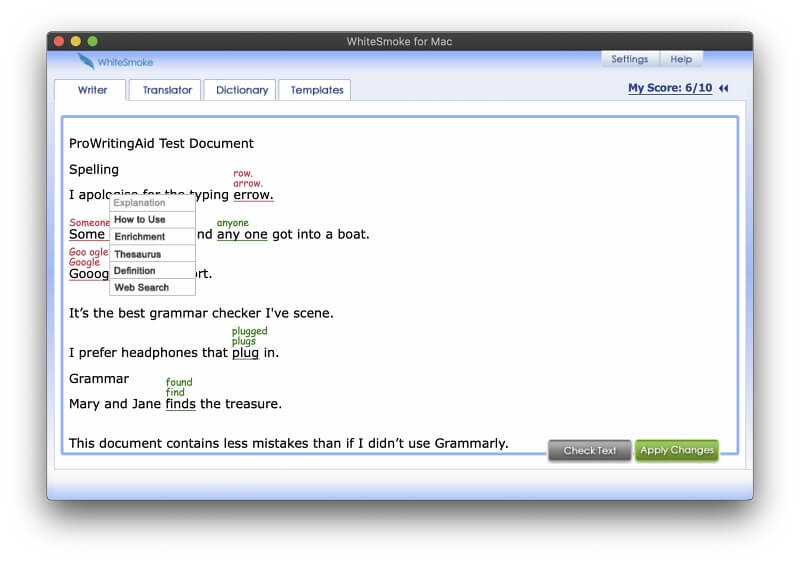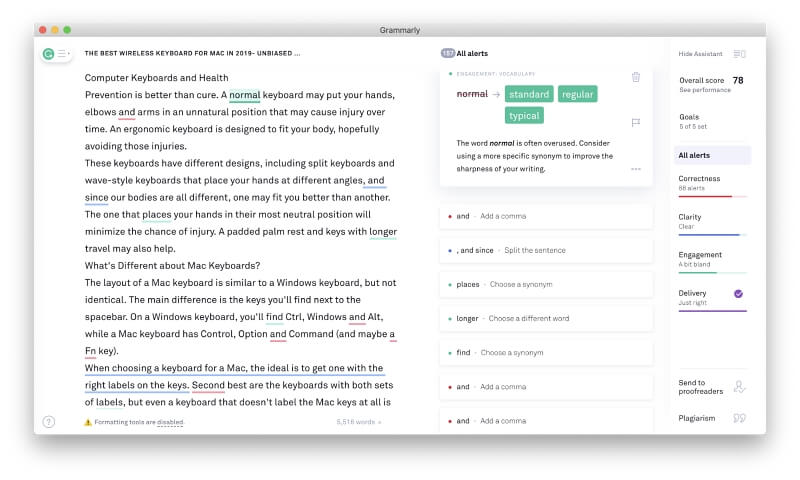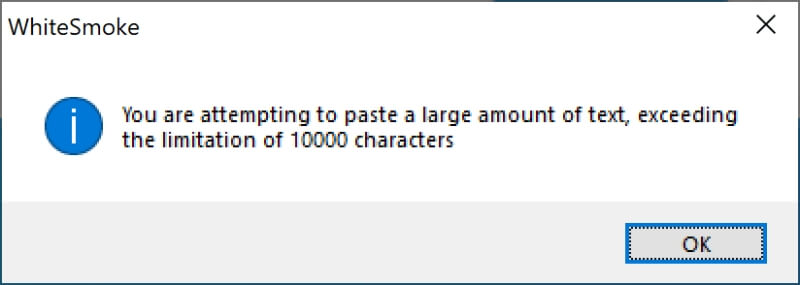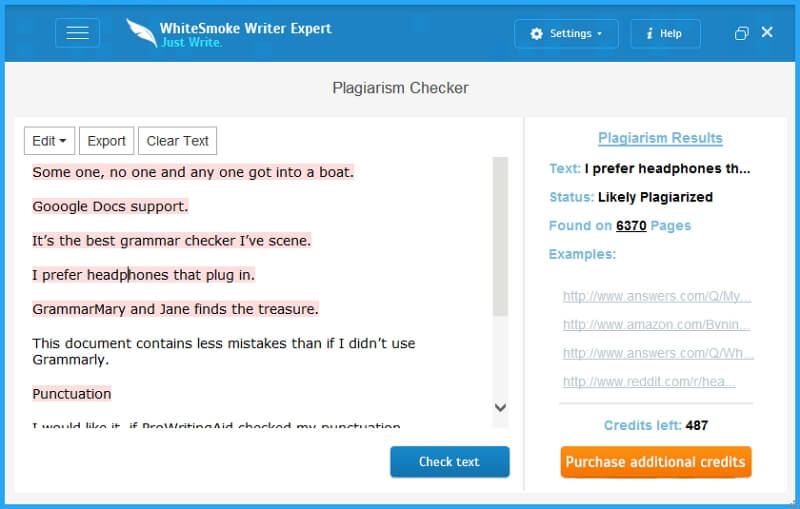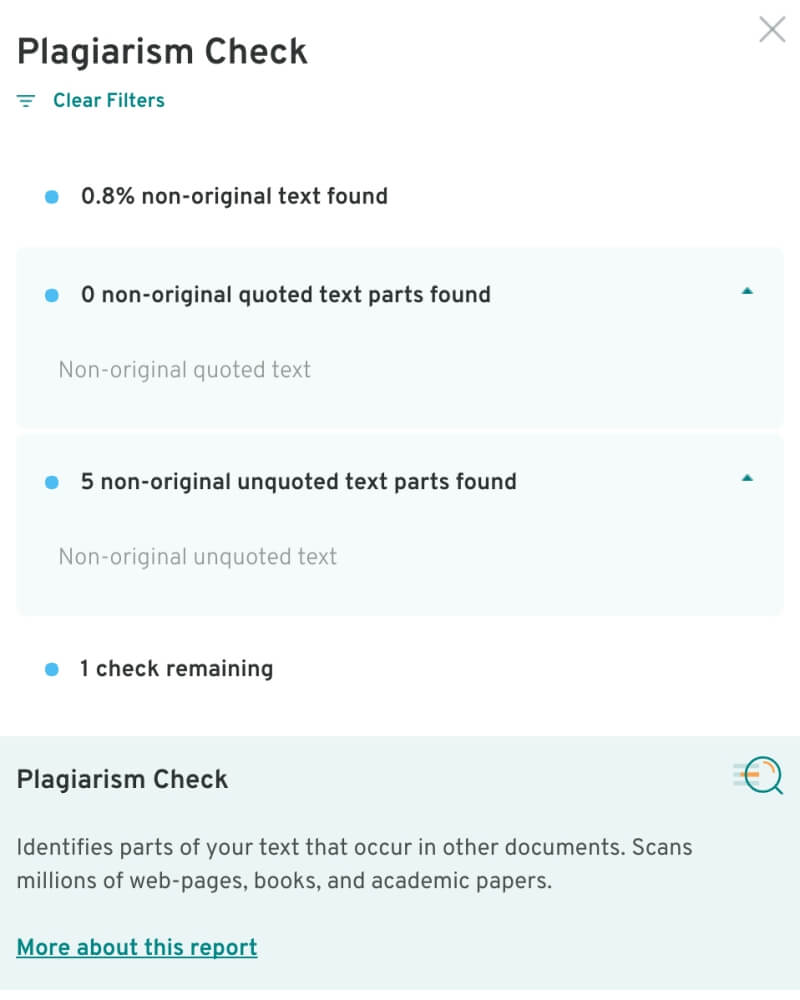Spelling and grammar mistakes aren’t funny. According to this BBC news, a single spelling mistake on your website may cause as many as 50% of potential customers not to commit to a purchase.
So before clicking on Publish or Send, use a quality grammar checker to make sure you’ve eliminated all embarrassing errors. Two popular options in the market are WhiteSmoke and Grammarly. How do they compare? Read this comparison review to find out.

WhiteSmoke is a software solution that checks spelling, grammar, punctuation, and style, using artificial intelligence to detect and correct any errors. It works in Word, Outlook, your web browser, and other text editing programs.
Grammarly is a popular alternative that does much of this for free; its Premium plan goes further, adding plagiarism detection. It’s the winner of our Best Grammar Checker roundup, and we covered its features in a full Grammarly review.
Table of Contents
WhiteSmoke vs. Grammarly: Head-to-Head Comparison
1. Supported Platforms
You need a grammar checker that runs on the computer or device you do your writing on. Fortunately, both apps support many popular platforms. Which is the better solution?
- On desktop: Grammarly. Both work on Mac and Windows, but currently only WhiteSmoke’s Windows app is up to date.
- On mobile: Grammarly. It offers keyboards for iOS and Android, while WhiteSmoke has no mobile presence.
- Browser support: Grammarly. It provides browser extensions for Chrome, Safari, Firefox, and Edge. WhiteSmoke doesn’t offer any browser extensions, so it won’t check your spelling as you type into a web page. But it does provide an online app that works on any browser.
Winner: Grammarly. Unlike WhiteSmoke, it will work on any web page or mobile app.
2. Integrations
Both companies offer apps that check spelling and grammar, but it’s often more convenient to check for errors in the program you’re writing in. Many do this in Microsoft Word, and fortunately, both apps support it.
Grammarly’s Office plugin offers tight integration on both Mac and Windows. Its icons are added to the ribbon, and Grammarly suggestions are visible in the right pane. WhiteSmoke takes a different approach: the app pops up when using a hotkey. Unfortunately, this currently doesn’t work on the Mac.
Grammarly takes another step forward by offering integration with Google Docs, which is particularly popular with those writing for the web.
Winner: Grammarly. It offers tighter integration with Microsoft Word than WhiteSmoke, and also supports Google Docs.
3. Spell Check
Poor spelling diminishes trust and suggests a lack of professionalism. You’ll uncover more errors by having a colleague or spelling program check your work than you’ll manage on your own. Can we trust these apps to catch our mistakes?
To find out, I created a short document with different types of spelling mistakes:
- An obvious mistake, “errow.”
- A word using UK spelling, “apologise.” I’m sometimes warned that I’ve unintentionally started to “spell with an Australian accent.”
- Context-sensitive spelling errors: “some one,” “no one,” and “scene” are real words, but are incorrect in the context of the sentences I wrote in the sample document.
- A misspelled company name, “Gooogle.” Some spelling checkers are unable to correct proper nouns, but I expect more from these artificially intelligent apps.
I then pasted the test document into WhiteSmoke’s online app and pressed “Check Text.” The errors were underlined, and corrections were viewable above. WhiteSmoke is the only grammar checker I’m aware of that does this. Other apps display suggested corrections only after hovering or clicking your mouse on the error.
WhiteSmoke found most of the errors. “Errow” was flagged, but a wrong correction is suggested. It’s the only app I tested that didn’t suggest “error.” “Some one,” “any one,” and “Gooogle” were all flagged and appropriately corrected.
The online and Mac versions of WhiteSmoke missed “scene,” which is a real word, but incorrect in context. The Windows version found the error and made the correct suggestions. The Mac and online apps still use an older version of WhiteSmoke but should be updated sometime soon.
The corrections weren’t perfect, however. No version of WhiteSmoke warned me about the UK spelling of “apologise,” and all tried to correct “headphones that plug in,” which wasn’t an error.
The free version of Grammarly found and corrected every spelling mistake. However, it also wrongly suggested I change the verb “plug in” to the noun “plugin.”
Winner: Grammarly. It identified and corrected every error, while WhiteSmoke missed a few. Both apps suggested one incorrect change.
4. Grammar Check
It’s not just bad spelling that can give a negative first impression—bad grammar will do the same. How reliable are our two apps at pointing out those sorts of errors? My test document also contained several types of grammar and punctuation errors:
- A mismatch between a plural subject and singular verb, “Mary and Jane finds the treasure.”
- An incorrect quantifier, “less mistakes.” The correct wording is “fewer mistakes.”
- An unnecessary comma, “I would like it, if Grammarly checked…”
- A missing comma, “Mac, Windows, iOS and Android.” The need for a comma at the end of a list (the “Oxford comma”) is debated but often preferred because it’s less ambiguous.
The online and Mac versions of WhiteSmoke found no grammar or punctuation errors. The Windows version flagged both grammar errors and made appropriate suggestions. However, it missed both punctuation errors. This issue is typical of other grammar checkers.
Grammarly flagged all the grammar and punctuation errors and suggested the right corrections. It warns of punctuation errors better than any other grammar checker I’m aware of.
Winner: Grammarly. Both apps identified grammar errors, but only Grammarly found punctuation errors. However, WhiteSmoke is inconsistent across platforms and didn’t find any grammar errors when using the online and Mac apps.
5. Writing Style Improvements
Both apps include features designed to improve your writing. WhiteSmoke’s approach is to place several tools at your disposal, which I found useful. When you click on a word, a pop-up menu is displayed:
- How to Use: gives examples of how the word has been used in literature.
- Enrichment: provides a list of adjectives or adverbs that can be used to describe it.
- Thesaurus: lists synonyms. If you prefer one to the original, a simple mouse click will switch them in your text.
- Definition: Supplies you with dictionary definitions from Princeton University’s database. A Dictionary tab allows you to access additional definitions from Wordnet English Dictionary, Wordnet English Thesaurus, and Wikipedia.
Grammarly’s Premium version evaluates clarity, engagement, and delivery as you type, then makes suggestions.
I tested it on one of my drafts. Here are some of the suggestions I received:
- It suggested I replace “important” with “essential” because the word “important” is often overused.
- It similarly suggested replacing “normal” with “standard,” “regular,” or “typical.”
- I used the word “rating” frequently. Grammarly suggested I replace some occurrences with “grade” or “score.”
- When I could use one word instead of several, Grammarly suggested I simplify for the sake of clarity—for example, replacing “on a daily basis” with “daily.”
- Grammarly identified where sentences were long or complicated and suggested I simplify or split them.
I wouldn’t implement every suggestion, but seeing them was helpful. I particularly valued the warnings about complex sentences and frequently-used words.
Winner: Grammarly. It identified numerous places I could improve the clarity and readability of my document, often with specific suggestions. WhiteSmoke’s tools are also well-implemented; some users may prefer their approach.
6. Check for Plagiarism
Copyright infringements are unprofessional and may lead to takedown notices. WhiteSmoke and Grammarly both check for plagiarism by comparing your document with billions of web pages and other publications. I pasted a draft into WhiteSmoke to test the feature and was surprised by an error message: there is a meager limit of 10,000 characters.
I chose a shorter document and encountered another problem: WhiteSmoke is very slow. I gave up on the first test after four hours and let another run overnight. It didn’t finish, either. So I tested an 87-word document instead.
I discovered a third problem: false positives. WhiteSmoke claimed that almost everything in the document was plagiarized, including the phrase “Google Docs support” and the word “punctuation.” Virtually the entire doc was marked. With that many false positives, finding genuine plagiarism would be like looking for a needle in a haystack.
I tested Grammarly with two different documents. The first contained no quotes; Grammarly identified it as being 100% original. The second did include quotes; Grammarly successfully identified and linked to the sources of the original quotes. Both checks took about half a minute.
Winner: Grammarly. WhiteSmoke was unable to check documents of any reasonable length and produced unacceptable results. Grammarly’s check was prompt and helpful.
7. Ease of Use
The interface of both apps is similar: errors are underlined, and corrections can be made with a single click. I appreciate the way that WhiteSmoke puts the revisions right there on the page.
But WhiteSmoke is spoiled by the small details. You need to press a button every time you want to check your document, while Grammarly checks automatically. You have to press a shortcut key in Word while Grammarly is integrated into the ribbon. It won’t check your spelling as you type into a web form, and I spent a day and a half trying to perform a plagiarism check.
Grammarly, on the other hand, just works.
Winner: Grammarly. It’s intuitive, and just works… everywhere.
8. Pricing & Value
Let’s start with what each app offers for free. Grammarly’s free plan performs unlimited spelling and grammar checks online, on desktop, and on mobile. In fact, they offer the most useful free plan that I’m aware of. WhiteSmoke doesn’t offer a free plan or even a free trial period. To test the program, I had to subscribe for a full year.
That yearly Premium subscription cost $79.95, and if I only wanted to use the online version, $59.95. That’s a lot more affordable than Grammarly’s $139.95 yearly subscription. To be fair, Grammarly includes unlimited plagiarism checks, while WhiteSmoke provides 500 credits, though I imagine very few people would need more.
Finally, there are discounts. WhiteSmoke’s current prices are advertised as 50% off. I’m not sure if that’s a limited time offer, but if it is, the yearly Desktop Premium subscription may increase to $159.50, making it more expensive than Grammarly.
WhiteSmoke recently sent a general email offering 75% off. When I clicked on the link, I could subscribe for $69.95 a year, which is only $10 cheaper. The “usual” price jumped from $13.33/month to $23.33/month to make the savings look bigger. I appreciate the rebate, but not the strategy.
Grammarly also offers discounts. Since signing up for a free account, I’ve been offered one every month (via email), ranging from 40-55%. That would bring the yearly subscription down to between $62.98 and $83.97, comparable to that of WhiteSmoke. When you consider how much better Grammarly works, that’s better value.
Winner: Grammarly. They offer the best free plan in the business, and their discounted Premium plan is in line with WhiteSmoke’s but offers superior performance.
Final Verdict
Grammar checkers help us protect our business’s reputation by eliminating spelling and grammar errors before it’s too late. They help us make our writing more effective and impactful and avoid copyright violations. The right app will become a trusted part of the writing process.
When choosing an app that deserves that trust, Grammarly is clearly the better choice. Both apps identify a wide range of spelling and grammar errors. Still, Grammarly works consistently across all platforms and is available on your mobile devices—and it’s better at identifying punctuation errors and plagiarism.
Grammarly offers a highly useful free plan, while WhiteSmoke doesn’t have one at all. If you need Premium features, WhiteSmoke gives a significant price advantage; however, this advantage fades when you take discounts into account. WhiteSmoke also requires a more substantial initial commitment—you can’t even test it without paying a full year in advance.
My recommendation is to sign up for a free Grammarly account and use it to check your spelling and grammar. You can then weigh up if you need the additional features. You’ll receive discount offers in your inbox each month that you can use once you decide to upgrade.

